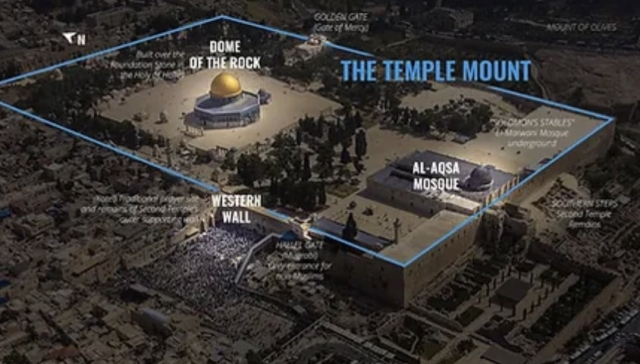A recent report detailing the "supervision of the preservation of antiquities and heritage values on the Temple Mount" has revealed disheartening findings. Published this month by the Knesset's Research and Information Center, the report asserts that the Waqf, supported by the King of Jordan, exercises unilateral authority on the Mount, while the Israeli government seemingly abets it by concealing the realities from its citizens.
In recent times, there had been an impression that matters regarding the Mount were progressing positively, particularly concerning the preservation of antiquities. The antiquities law, enacted by the Knesset in 1978, mandates the approval of a special committee of ministers before any renovation or construction on an antiquities site designated for religious purposes can take place. This rule predominantly refers to the Temple Mount, where the religious authority – an entity deeply entrenched in political maneuvering – recurrently conflicts with Israel's archaeological interests.
Waqf control over the Temple Mount has caused unimaginable damage to Jewish antiquities on the site, part of an attempt to erase Jewish history from its epicenter. https://t.co/SIglWmIwIS
— David May (@DavidSamuelMay) July 5, 2018
The intended structure for this committee is to be chaired by the Minister of Culture, accompanied by the Minister of Religion and the Minister of Justice. However, in practice, the committee remained un-convened until 2009. In the thirty years that elapsed between the law's enactment and its implementation, the Mount witnessed immense destruction. Islamic authorities clandestinely removed 400 truckloads of dirt from a pit in 1999, ostensibly to create an emergency opening for an underground mosque. Archaeologists continue to sift through the excavated dirt even now. Many other damages, such as the digging of a deep electrical trench at the temple site in 2007, have occurred without prompting any ministerial committee meeting.
According to the newly released report, the committee convened nine times between 2009 and 2015 to approve 19 works demanded by the Waqf on the Mount. These works included the renovation of the marble in the walls of the Dome of the Rock, conservation work, engineering operations in the entrance vault to “Solomon’s stables,” and the replacement of the Al-Aqsa Mosque doors. After 2015, the committee met only once, in January 2019, in a session defined as classified.
The Muslim Waqf exactly knows what was on Temple Mount before the Dome of the Rock and (The real) Al Aqsa (in the Northernmost corner of the mount), although they keep shtum about it today. From tourist guide, 1924. pic.twitter.com/BbI2snFMHc
— Eretz Israel (@EretzIsrael) June 5, 2023
The report painfully concludes that "information regarding the state of supervision of the preservation of the antiquities of the Temple Mount in recent years is extremely scarce." In response to a request by “Makor Rishon” to acquire details about damages to antiquities from 2011 onwards, the Antiquities Authority disconcertingly responded, “The Antiquities Authority has information regarding the aforementioned. We can provide details in a classified discussion only."
Nice to see radical anti-Israel violence supporters like @Isi_baehr admit that on the Temple Mount in Jerusalem, the Waqf, (a racist backwards Jordanian "religious" authority) enforce a strict law prohibiting non Muslims from prayer.
— Rabbi S Litvin (@BluegrassRabbi) August 24, 2023
Meanwhile the NYT complains about the Kotel. https://t.co/jDG1Gr6SIV
The findings of the report raise pressing questions and concerns about transparency, governmental oversight, and the complex interplay of religion, politics, and archaeology on one of the world's most sensitive and contested sites. The narrative indicates a failure of administration and hints at possibly irreparable damage to the rich historical and cultural heritage of the Temple Mount. It underscores the imperative need for responsible stewardship and open dialogue in preserving the integrity of a location with profound significance for multiple faiths and the global community.


